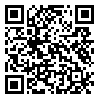1. Buller AM, Pichon M, Chevalier C, Treves–Kagan S. The role of gender and romantic jealousy in intimate partner violence against women, a mixed–methods study in Northern Ecuador. Cult Health Sex. 2023;25(2):223–40. [
DOI]
2. Hameleers M, Bos L, de Vreese CH. Selective exposure to populist communication: how attitudinal congruence drives the effects of populist attributions of blame. Journal of Communication. 2018;68(1):51–74. [
DOI]
3. Rezvani H, Saemi H. Correlation between self–differentiation and neuroticism with emotional divorce in married students of Azad Shahr Azad University. Journal of Health Promotion Management. 2019;8(2):23–30. [Persian] [
Article]
4. Bahoush F, Ebrahimpour M. Investigating the relationship between self-differentiation and emotional divorce. In: The 2nd International Conference on Educational Sciences, Psychology, Counseling, Education and Research [Internet]. Iran, Tehran: Civilica; 2019 [cited 2025 May 20]. [Persian] [
Article]
5. Dehghan Khalili S, Honarparvaran N. Relationship between metacognitive awareness and differentiation with sexual self–esteem in women. Woman & Study of Family. 2017;9(35):35–47. [Persian] [
Article]
6. Souri G, Kariinejad K, Ghanbari V, Karimian S. The role of self-differentiation and spiritual intelligence in predicting emotional divorce. In: The 1st International Conference on Modern Researches in the Field of Educational Sciences, Psychology and Social Studies of Iran [Internet]. Iran, Qom; Civilica: 2015. [
Article]
7. Talebi M, Ghobari Bonab B. A study of the relationship of self–differentiation and emotional intelligence with investigating the relationship of self–differentiation and emotional intelligence with marital satisfaction in Shahroud counseling centers. Woman & Study of Family 2013;5(18):15–31. [Persian] [
Article]
8. Ghasemi S, Etemadi O, Ahmadi. Pathology of couples and in–law family interactions: a qualitative study. Journal of Qualitative Research in Health Sciences.2015;5(3):250–62. [Persian] [
Article]
9. Puente S, Cohen D. Jealousy and the meaning (or nonmeaning) of violence. Pers Soc Psychol Bull. 2003;29(4):449–60. [
DOI]
10. Valentova JV, de Moraes AC, Varella MAC. Gender, sexual orientation and type of relationship influence individual differences in jealousy: a large Brazilian sample. Personality and Individual Differences. 2020;157. [
DOI]
11. Kyegombe N, Stern E, Buller AM. "We saw that jealousy can also bring violence": a qualitative exploration of the intersections between jealousy, infidelity and intimate partner violence in Rwanda and Uganda. Soc Sci Med. 2022;292:114593. [
DOI]
12. Jafarimanesh M, Zahrakar K, Taghvaei D, Pirani Z. The effectiveness of reality therapy training on marital burnout in couple with marital conflicts. Journal of Research in Behavioural Sciences. 2020;18(3):288–99. [Persian] [
DOI]
13. Hokm Abadi ME, Rezaei AM, Asghari Ebrahim Abad MJ, Salamat A. The effect of group new reality therapy based on choice theory on hopefulness in drug abusers. Studies in Medical Sciences. 2014;25(8):752–9. [Persian] [
Article]
14. Naderi A, Yaghubi H, Saffarian–Tousi MR, Iranmanesh A. Comparing the effectiveness of group counseling based on reality therapy and schema therapy approaches on self–differentiation in dependent women. Journal of Clinical Psychology. 2022;14(3):1–12. [Persian] [
DOI]
15. Sheyda S, Masoudi S. The effectiveness of group reality therapy on self–differentiation and social well–being of women heads of households. In: The 3rd International Conference on Psychology, Educational Sciences and Social Studies [Internet]. Iran, Hamedan: Civilica; 2019 [cited 2025 May 20]. [
DOI]
16. Glasser W. Choice theory: a new psychology of personal freedom. Sahebi A. (Persian translator). Tehran: Sayeh Sokhan; 2023, pp: 564–670.
17. Lawshe CH. A quantitative approach to content validity. Personnel Psychology. 1975;28(4):563–75. [
DOI]
18. Skowron EA, Schmitt TA. Assessing interpersonal fusion: reliability and validity of a new DSI Fusion with Others Subscale. J Marital Fam Ther. 2003;29(2):209–22. [
DOI]
19. Fakhari N, Latifian M, Etemd J. A study of psychometric properties of the Executive Skills Scale for pre–school children (parent form). Quarterly of Educational Measurement. 2014;5(15):35–58. [Persian] [
Article]
20. Valizadeh A, Azarbaijani M. The primary test of jealousy based on Islamic sources. Psychology and religion. 2010;3(2):45–60. [Persian]
21. Jafari F, Pourshahriari MS, Fayyaz F, Abdollahi A. The effectiveness of couple therapy model from the perspective of Quran and Islamic narrations on family efficiency and jealousy of couples. Applied Family Therapy Journal. 2023;4(1):238–67. [Persian] [
DOI]





